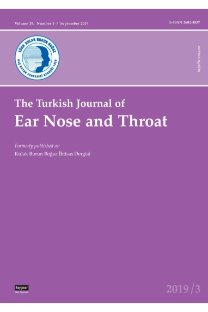Koklea implantı yapılan hastalarda sosyal ve demografik özelliklerin komprehensif reseptif ve ekspresif performans üzerine etkisi
Amaç: Bu çalışmada sosyal ve demografik özelliklerin prelingual pediatrik koklea implantı yapılan hastaların dil gelişimi üzerindeki etkileri gözlendi.Hastalar ve Yöntemler: Nisan 2006 - Nisan 2010 tarihleri arasında prelingual olarak implant takılan ve en az 36 ay implant deneyimi olan 44 çocuk 26 erkek, 18 kız; ort. yaş 81.1±16.9 ay; dağılım 54-115 ay retrospektif olarak incelendi. Yalnızca mental-motor retardasyonu, koklear anomalisi olmayan ve revizyon cerrahisi yapılmayan ve eğitimini ara vermeden kesintisiz sürdüren hastalar seçildi. Bu hastalara reseptif ve ekspresif kelime testleri yapıldı. Cinsiyet, implant yaşı, ebeveynlerin eğitim durumu ve yıllık gelirleri gibi sosyal ve demografik özellikleri kaydedildi. Dil gelişimi ve sosyo-demografik faktörler arasındaki ilişkiler incelendi.Bulgular: Otuz altı aydan önce implant takılan hastaların reseptif ve ekspresif dil düzeyleri daha iyiydi. Maternal eğitim düzeyi yüksek olan çocukların ekspresif ve reseptif eş değeri dil yaşları anlamlı düzeyde daha iyiydi. Ailelerin yıllık gelirlerinin 36 aydan önce implant takılan çocukların dil gelişimine anlamlı düzeyde olumlu etkileri vardı.Sonuç: Otuz altı aydan sonra takılan implantlarda hem ekspresif hem de reseptif dil becerileri, implant yaşı ve ebeveynlerin sosyo-ekonomik durumları ile anlamlı düzeyde ilişkilidir
The impact of social and demographic features on comprehensive receptive and expressive performance in cochlear implant patients
Objectives: This study aims to observe the effects of social and demographic factors on the language development of prelingual pediatric cochlear implant patients. Patients and Methods: Between April 2006 and April 2010, 44 children 26 boys, 18 girls; mean age 81.1±16.9 months; range 54 to 115 months who were prelingually implanted and who had an implant experience of at least 36 months were retrospectively analyzed. Only the patients without mental-motor retardation, cochlear anomaly and revision surgery and who continued their education without any interruption were selected. Receptive and expressive vocabulary tests were performed on these patients. Social and demographic features including gender, implant age, parents’ education status and annual income were recorded. The relationship between language development and socio-demographic factors were investigated. Results: Patients implanted before the age of 36 months showed better levels of receptive and expressive language. Children with higher maternal education levels showed significantly better expressive and receptive equivalent language ages. Annual income of the families had significant positive impacts on the language development of the children who were implanted before the age of 36 months. Conclusion: Both expressive and receptive language skills over 36 months of implant experience are significantly associated with age at the time of the implant and socio-economic status of the parents.
